|
|
|
Sort Order |
|
|
|
Items / Page
|
|
|
|
|
|
|
| Srl | Item |
| 1 |
ID:
087004
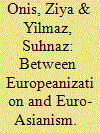

|
|
|
|
|
| Publication |
2009.
|
| Summary/Abstract |
Focusing on Turkish foreign policy in the post-Cold War era, this paper argues that the period can be divided into three distinct phases: an initial wave of foreign policy activism in the immediate post-Cold War context; a new or second wave of foreign policy activism during the Justice and Development Party (Adalet ve Kalk?nma Partisi, AKP) government era with a strong emphasis on Europeanization; and the more recent tension between Europeanization and Euro-Asianism. This paper argues that during the AKP era Turkey maintained considerable continuity in terms of foreign policy activism and a multilateral approach to policymaking. Yet at the same time, a certain discontinuity or rupture can be identified starting in the middle of the first AKP government's reign, signifying a shift from a commitment to deep Europeanization to loose Europeanization along with a parallel shift to a soft Euro-Asianism. Ultimately, the interaction between an intricate set of priorities on the domestic and international fronts will determine the future path of Turkish foreign policy.
|
|
|
|
|
|
|
|
|
|
|
|
|
|
|
|
| 2 |
ID:
087006
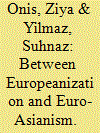

|
|
|
|
|
| Publication |
2009.
|
| Summary/Abstract |
Focusing on Turkish foreign policy in the post-Cold War era, this paper argues that the period can be divided into three distinct phases: an initial wave of foreign policy activism in the immediate post-Cold War context; a new or second wave of foreign policy activism during the Justice and Development Party (Adalet ve Kalk?nma Partisi, AKP) government era with a strong emphasis on Europeanization; and the more recent tension between Europeanization and Euro-Asianism. This paper argues that during the AKP era Turkey maintained considerable continuity in terms of foreign policy activism and a multilateral approach to policymaking. Yet at the same time, a certain discontinuity or rupture can be identified starting in the middle of the first AKP government's reign, signifying a shift from a commitment to deep Europeanization to loose Europeanization along with a parallel shift to a soft Euro-Asianism. Ultimately, the interaction between an intricate set of priorities on the domestic and international fronts will determine the future path of Turkish foreign policy.
|
|
|
|
|
|
|
|
|
|
|
|
|
|
|
|
| 3 |
ID:
068292


|
|
|
| 4 |
ID:
190819
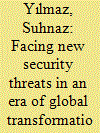

|
|
|
|
|
| Summary/Abstract |
Turkey's geopolitical position at the intersection of numerous conflict-laden regions has compelled Ankara to prioritize hard security concerns in defining its foreign and domestic policies. While these concerns will maintain their significance, new global threats and opportunities, particularly in energy security, climate change, and sustainability, necessitate a reconceptualization of security. This study posits that this new conceptualization must be more comprehensive by integrating these new challenges into conceptions security. After presenting pressing transformations in the energy security and climate change realm, the critical puzzle that the article will explore is Turkey's main challenges and opportunities in meeting its rapidly increasing energy needs on the one hand and facing mounting climate change and sustainability-related risks on the other. Moreover, the study will examine the domestic and foreign policy implications of these transformations in times of global changes and uncertainties.
|
|
|
|
|
|
|
|
|
|
|
|
|
|
|
|
| 5 |
ID:
084607


|
|
|
| 6 |
ID:
082076


|
|
|
|
|
| Publication |
2008.
|
| Summary/Abstract |
Ziya Öni? and ?uhnaz Yilmaz discuss the nature of the current Turkish-Greek rapprochement. They conclude that while the relations have improved, in order to reach a durable partnership and to move beyond the existing stalemate, a more proactive approach from both sides on core issues of conflict is necessary
|
|
|
|
|
|
|
|
|
|
|
|
|
|
|
|
| 7 |
ID:
114162
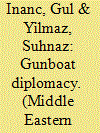

|
|
|
|
|
| Publication |
2012.
|
| Summary/Abstract |
This article aims to re-evaluate the visit of the battleship USS Missouri to Turkey on 5-6 April 1946, to ascertain whether or not it might be considered an early attempt on the part of the United States to challenge the Soviet Union. Greater historical clarity than previously possible has been achieved through the use of hitherto unreleased documents from the archives of the Ministry of Foreign Affairs of the Turkish Republic. Moreover, this article aims to achieve a more balanced and comprehensive analysis by integrating the systemic factors with the actions of crucial actors at the individual level based on new archival evidence. By doing this, the main argument emerges whereby the United States displayed its power against the Soviets via the visit of the USS Missouri only in hindsight; while the decision to send home the exhumed body of the late Turkish ambassador Mehmet Münir Ertegün was the action of an individual. However, due to the advent of the Cold War, the dynamics shaping Turkey's search for security and ultimately the containment policy of the United States, has loaded the event with more meaning than was originally intended, turning a 'diplomatic courtesy' into 'gunboat diplomacy'.
|
|
|
|
|
|
|
|
|
|
|
|
|
|
|
|
| 8 |
ID:
149433


|
|
|
|
|
| Summary/Abstract |
By analyzing Turkey’s relations with Great Britain and the US in a period of drastic change (1929–47), this article argues that the origins of the shift in the orientation of Turkish foreign policy from Pax Britannica to Pax Americana not only affected the perceptions and strategies of relevant powers, but also entailed a dynamic interactive process. It asserts that the transition featured aspects of significant change, as well as continuity for the region. It demonstrates that while attempting to bandwagon with the relatively stronger naval, military, and economic partner, Turkey also endeavored to pursue a more autonomous foreign policy at various stages of this transition.
|
|
|
|
|
|
|
|
|
|
|
|
|
|
|
|
| 9 |
ID:
185548


|
|
|
|
|
| Summary/Abstract |
The key puzzle that this article explores is how the Great Powers’ wedging strategies and Turkey’s efforts to balance these powers defined complex strategic alignment dynamics during the 1930s and World War II. We posit that in the 1930s, as Turkey strove to balance the European great powers, these powers resorted to wedging strategies to sway Turkey away from any other sphere of influence. During World War II, increasing US engagement in the region compelled Ankara to utilize a ‘dual balancing strategy’ to preserve its neutrality, by balancing between the Axis and the Allies and between the British and the Americans. Concomitantly, both Allies and Axis powers utilized predominantly reward-wedging strategies to keep Turkey away from the opposing bloc. We assert that in rethinking strategic alignment more emphasis should be placed on the interactive nature of wedging process and the role and motives of agency.
|
|
|
|
|
|
|
|
|
|
|
|
|
|
|
|
| 10 |
ID:
143567
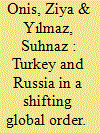

|
|
|
|
|
| Summary/Abstract |
The current global political economy is characterised by the intensifying economic interaction of BRICS and ‘near BRICS’ economies, with emerging powers increasing their influence in neighbouring regions. The growing partnership between Turkey and Russia constitutes a useful case study for examining this transformation, in which Western supremacy and US hegemony are under increasing challenge. Turkish–Russian relations shed light on broader themes in global political economy. First, significant economic interdependence may be generated among states with different political outlooks, in the form of loose regional integration schemes driven by bilateral relations between key states and supporting private actors or interests. Second, growing economic interdependence may coexist with continued political conflict and geopolitical rivalry, as indicated by the Syrian and Ukrainian crises. An important strategy that emerges is the tendency to compartmentalise economic issues and geopolitical rivalries in order to avoid negative spill-over effects. This facilitates the coexistence of extensive competition with deepening cooperation, as reflected in relations in the field of energy.
|
|
|
|
|
|
|
|
|
|
|
|
|
|
|
|
| 11 |
ID:
061704
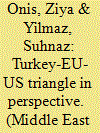

|
|
|
|
|
| Publication |
Spring 2005.
|
| Summary/Abstract |
This article examines the delicate dynamics of the triangle of Turkey-EU-US relations. While acknowledging the role of the United States in promoting close links between Turkey and the EU, this study underlines the limits of American influence on EU decision-making on issues concerning “deep integration.” In this context, the future of this triangular relation depends on the interplay of contending forces in Turkey’s domestic political arena as well as the dynamics of trans-Atlantic relations in the international scene.
|
|
|
|
|
|
|
|
|
|
|
|
|
|
|
|
|
|
|
|
|